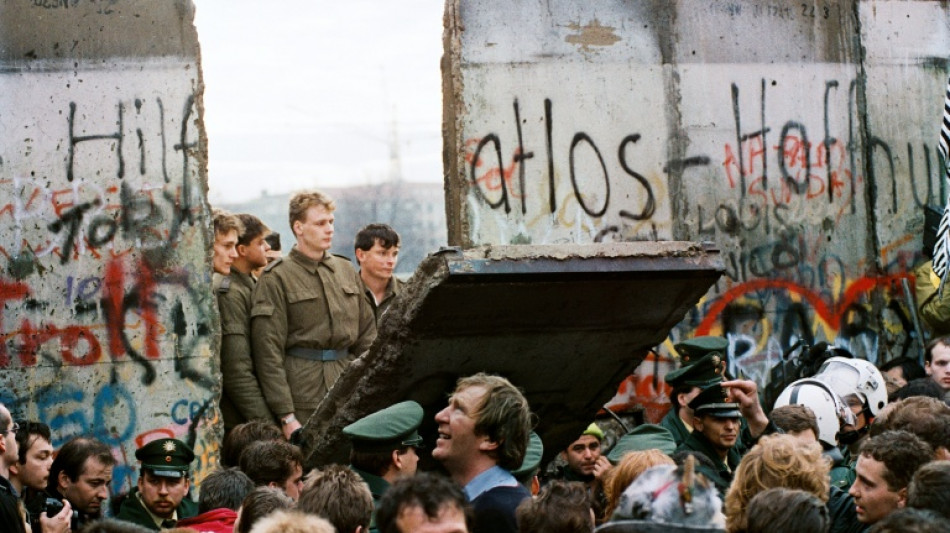
-
 US comics slam 'censorship' after Kimmel pulled
US comics slam 'censorship' after Kimmel pulled
-
China's Xiaomi to remotely fix assisted driving flaw in 110,000 SU7 cars

-
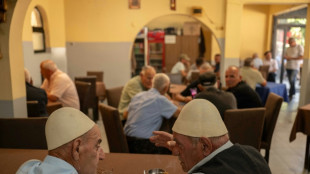 Brewing battle: coffee booms in tea-loving Kosovo
Brewing battle: coffee booms in tea-loving Kosovo
-
Dortmund on lookout for leaders as familiar cracks emerge

-
 BoJ holds interest rates but to sell funds in shift from easing policy
BoJ holds interest rates but to sell funds in shift from easing policy
-
Real Madrid aiming to stay perfect against impressive Espanyol

-
 Georgia's Niniashvili aims to stay 'crazy' at new club La Rochelle
Georgia's Niniashvili aims to stay 'crazy' at new club La Rochelle
-
Latinos, ex-military, retirees -- ICE hopefuls answer Uncle Sam's call
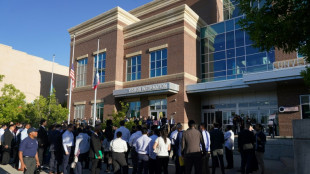
-
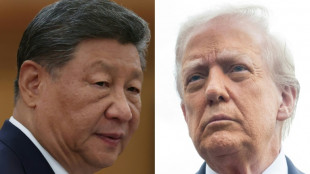 Trump hopes to settle TikTok's fate on Xi call
Trump hopes to settle TikTok's fate on Xi call
-
East Germany's empty towns try to lure people with 'trial living'

-
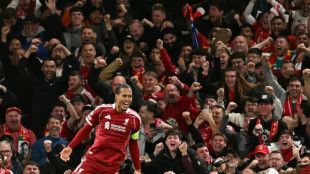 Liverpool crave easy win in Merseyside derby as Arsenal seek Man City hat-trick
Liverpool crave easy win in Merseyside derby as Arsenal seek Man City hat-trick
-
Australia skipper Cummins says 'hopeful' he'll take part in Ashes

-
 China warns Papua New Guinea over Australian defence deal
China warns Papua New Guinea over Australian defence deal
-
Australian state bans testing of illicit drugs

-
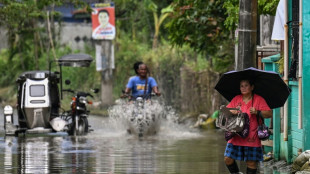 Philippines 'ghost' flood projects leave residents stranded
Philippines 'ghost' flood projects leave residents stranded
-
Asian markets fluctuate as focus turns to Trump-Xi, BoJ

-
 North Korea's Kim oversees drone test, orders AI development
North Korea's Kim oversees drone test, orders AI development
-
Kenya eye double gold on penultimate day of world championships

-
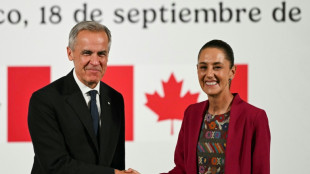 Canada, Mexico leaders agree to seek 'fairer' trade deal with US
Canada, Mexico leaders agree to seek 'fairer' trade deal with US
-
How did an Indian zoo get the world's most endangered great ape?

-
 Amid emotional retirement reveal, Kershaw focused on beating Giants
Amid emotional retirement reveal, Kershaw focused on beating Giants
-
Dodgers pitching icon Kershaw to retire after 18th MLB season

-
 Netflix seeks 'Money Heist' successor in Spanish hub
Netflix seeks 'Money Heist' successor in Spanish hub
-
Taiwan running out of time for satellite communications, space chief tells AFP

-
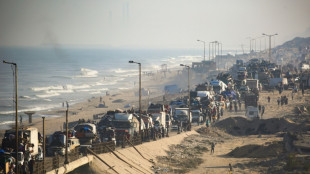 Gaza, Palestinian future to dominate UN gathering
Gaza, Palestinian future to dominate UN gathering
-
Young plaintiffs stand tall after taking on Trump climate agenda in court

-
 Kirk killing sparks fierce US free speech debate
Kirk killing sparks fierce US free speech debate
-
Eying bottom line, US media giants bow to Trump

-
 Indie studio bets on new game after buying freedom from Sega
Indie studio bets on new game after buying freedom from Sega
-
Marseille hoping to catch PSG at the right time in Ligue 1

-
 Japan inflation slows in August, rice price surges ease
Japan inflation slows in August, rice price surges ease
-
Court seizes assets of Maradona's lawyer, sisters in fraud case

-
 Genflow Strengthens IP Portfolio
Genflow Strengthens IP Portfolio
-
RFK Jr panelists make initial changes to childhood vaccine schedule

-
 RFK Jr panelists make first changes to childhood vaccine advice
RFK Jr panelists make first changes to childhood vaccine advice
-
Progress stalled on Canada's pollution reduction goal

-
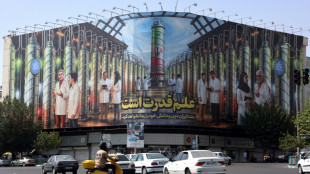 UN Security Council votes on reimposing Iran nuclear sanctions
UN Security Council votes on reimposing Iran nuclear sanctions
-
Depleted France eager to 'throw sand in England's machine' in World Cup semi-final

-
 Barcelona beat Newcastle, Man City see off Napoli in Champions League
Barcelona beat Newcastle, Man City see off Napoli in Champions League
-
Texans' Ward won't face domestic violence charges

-
 Alcaraz headlines Team Europe in Laver Cup title defense
Alcaraz headlines Team Europe in Laver Cup title defense
-
Rashford bags first Barca goals to seal win at Newcastle

-
 Haaland hits 50 Champions League goals in Man City cruise over 10-man Napoli
Haaland hits 50 Champions League goals in Man City cruise over 10-man Napoli
-
Dodgers pitching icon Kershaw to retire - club

-
 Eagles seek answers against Rams in battle of NFL unbeatens
Eagles seek answers against Rams in battle of NFL unbeatens
-
Afghanistan crash out of Asia Cup after six-wicket loss to Sri Lanka

-
 EU states agree broad UN emissions target avoiding 'embarrassment'
EU states agree broad UN emissions target avoiding 'embarrassment'
-
US regulator sues Ticketmaster over 'illegal' ticket schemes

-
 US small businesses slam Trump tariffs as legal fight proceeds
US small businesses slam Trump tariffs as legal fight proceeds
-
All smiles as Melania and Kate meet kids in first public event


East Germany's empty towns try to lure people with 'trial living'
Depopulated towns in Germany's ex-communist east have come up with a novel scheme to bring back life: offering people several weeks of super-cheap housing to give would-be residents a taste of the place.
The "trial-living" scheme aims to revitalise half-deserted communities as Germany nears the 35th anniversary of its reunification on October 3.
One of those giving it a shot is Weslawa Goeller, 50, a kindergarten educator with a two-year-old daughter who is getting to know the small town of Guben on the Polish border.
Hailing from the much bigger western German city of Mainz, she said she found the quiet streets unsettling at first: "Since I arrived, I feel like I never see anyone."
"But it's green and quiet," she added, warming to the town's tranquil charms, as well as the free childcare for her toddler.
"I could easily work here as an educator," she told AFP, sitting at a terrace cafe.
Goeller was among 16 people who came over the summer to discover the town and its services under a scheme run by local authorities, a tourism agency and real estate companies.
They paid just 100 euros ($118) in weekly rent for a maximum of four weeks, with a view to settling there.
While finding a reasonably priced flat in Berlin has become a real struggle, many properties in Guben can be rented for just five to seven euros per square metre.
"Old trees like me are hard to uproot," said Goeller. "But I might decide to move here."
- 'Bomb for economy' -
Like many places in the east, Guben hit hard times in the years after the Berlin Wall fell in 1989.
As the Soviet-backed regime collapsed and outdated businesses closed across the east, waves of unemployment sparked population flight and a sense of social dislocation.
Scars from that turbulent era and an enduring east-west wealth gap are often cited as contributing to the surging popularity of the far-right Alternative for Germany (AfD) party in the east.
While large cities like Dresden and Leipzig are growing, smaller eastern towns continue to see young people and women leaving, said Tim Leibert, a researcher at the Leibniz Institute of Geography.
The trend threatens to become "a bomb for the German economy", he said.
Eastern Germany could lose between eight and 16 percent of its population over the next 20 years, according to the statistics institute Destatis.
Guben also saw its population plummet from around 31,000 in 1990 to just 16,000 today.
Its slogan, "A town where people stay", contrasts sharply with the empty streets and blank advertising spaces.
- Overcoming prejudice -
Some of the newcomers like it that way -- among them former social worker Anika Franze, 38, who gave up the "Berlin party scene" to move here last year.
She now works for the trial-living initiative, persuading others to move to her adopted town.
For her, it was essential to test life in Guben for several weeks before making the move.
"Not having to decide immediately whether to move is a very modern concept, a bit like a 30-day right of return," she said.
Kerstin Geilich, 61, the head of the Guben repopulation project, said she remembers the trauma of the 1990s when the east German economy collapsed.
The situation in the region has improved since then, she said, with factories reopening and jobs available in other sectors such as healthcare.
But prejudices remain difficult to overcome, according to Geilich. "It's hard to make (people) understand that you can find a good job here today."
- 'Tragedy of the 1990s' -
Thirty kilometres (48 miles) north of Guben, the town of Eisenhuettenstadt launched a similar programme this year, to help overcome what Mayor Frank Balzer calls "the tragedy of the 1990s".
The town was built from scratch in 1950 as a hub for communist East Germany's steel industry and was originally known as Stalinstadt.
It has lost half its population since reunification, and its historic blast furnaces, taken over by Arcelor Mittal, now operate with one quarter of the former workforce.
One person considering a move to Eisenhuettenstadt is IT consultant Melanie Henninger, who hails from the east but now lives in the west German city of Bremen.
"I would like to contribute to society here, for example by training older people in digital technology," she told AFP during a recent visit.
Henninger said she "tries not to have any preconceptions" over the strength of the far right in the region and that instead "I have to give this place a chance".
Y.Kobayashi--AMWN